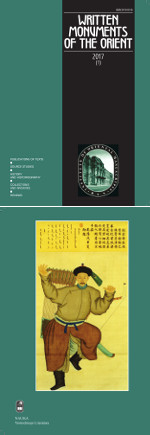 | Written
Monuments
of the Orient 1(5), 2017
Issued twice a year
The entire issue as a *.PDF file
Olga Chunakova, Federico Dragoni, Enrico Morano. A forgotten Manichaean Sogdian bifolio in Sogdian script — 3
Abstract: The present paper consists of the first edition, translation and commentary of
a Manichaean Sogdian bifolio, whose photos are preserved in the Nachlass of Academician
Carl H. Salemann at the Institute of Oriental Manuscripts, RAS (St. Petersburg).
The present location of the bifolio is unknown. One joining fragment has been found in
the Berlin Turfan collection during the preliminary work on this edition. Two relatively
long portions of Manichaean didactic treatises are extant and do not correspond to any
known text. The first (I) is a Lehrtext on the duties of Manichaean monks living in a
monastery. The second (II) contains the fourth and part of a fifth question, followed by
answers, of a catechetical text concerning the fate of the body and of the soul after death.
Key words: Manichaeism, Manichaean didactic literature, Sogdian language, Sogdian
manuscripts, Carl H. Salemann, Turfan texts, text edition, Iranian philology
Adam Benkato. Sogdian letter fragments in the Institute of Oriental Manuscripts,
St. Petersburg — 26
Abstract: Among the Sogdian fragments from Turfan preserved in the IOM collections
are a handful of epistolary texts. A new edition of these fragments is presented here as
part of the author’s ongoing project on Sogdian letters from Turfan.
Key words: Sogdian, epistolary texts, Turfan, Manichaeism
Peter Zieme. An Embryonic Saint. Interpretation of an Old Uighur Fragment in
the Serindia Collection at the IOM, RAS — 40
Abstract: In this paper the author edits a fragment of the Oldenburg Collection of the
Institute of Oriental Manuscripts. The text is a unique story about a child in mother’s
womb attaining the srota-āpanna-ship by listening to Buddha’s teaching.
Key words: Old Uighur Buddhism, Oldenburg Collection, dharma and srota-āpanna, Old
Uighur words
Alexander Zorin. Fragments of Tibetan Texts Refound at the Dunhuang Collection Kept
at the IOM, RAS: Eleven Identified Fragments of Buddhist Canonical
Texts — 49
Abstract: the paper presents texts of eighteen identified Tibetan fragments kept at the
IOM, RAS Dunhuang Collection. These are fragments of five canonical Buddhist texts:
Shes rab kyi pha rol tu phyin pa stong phrag brgya pa pa (7 fragments), ’Phags pa ’jigs
pa chen po brgyad las sgrol ba zhes bya ba’i gzungs (1 fragment), ’Phags pa chos thams
cad kyi yum zhes bya ba’i gzungs (an almost complete text), ’Phags pa tshe dang ye shes
dpag tu med pa zhes bya ba theg pa chen po’i mdo (1 fragment), De bzhin gshegs pa
bdun gyi sngon sman lam gyi khyad par rgyas pa zhes bya ba mdo sde bklag cing de
bzhin gshegs pa bdun mchod de| smon lam gdab pa’i cho ga mdo sde las btus te rim par
bklag pa (1 fragment). The first four texts can be found in Bka’ ’gyur, the latter one in
Bstan ’gyur. The Derge edition of Bka’ ’gyur and Bstan ’gyur was used to fill the
lacunae in the fragments.
Key words: Tibetan manuscripts from Dunhuang, Tibetan Buddhist texts
Hartmut Walravens. Symbolism of sovereignty in the context of the Dzungar campaigns
of the Qianlong emperor — 73
Abstract: The Qianlong emperor (reigned 1736–1795) proved to be a master in
documenting and glorifying his military exploits and creating his own myth. He used a
variety of media (paintings, copper-engravings, inscriptions, books, hymns, parades,
ceremonies, banquets) for this purpose and would be considered today a master of
advertising and public relations.
Key words: Qianlong emperor, China — military campaigns: China, 18th c.
Reviews
Joseph F. O’Callaghan. The Last Crusade in the West: Castile and the
Conquest of Granada. Philadelphia: University of Pennsylvania Press,
2014, by Anastasia Stepanova — 91
Catalogue of Japanese Manuscripts and Rare Books. Merete Pedersen.
The Royal Library, Copenhagen, Denmark. Catalogue of Oriental
Manuscripts, Xylographs, etc. in Danish Collections (COMDC),
by Karine Marandjian — 95
Anton Schiefner (1817–1879) und seine indologischen Freunde:
seine Briefe an die Indologen Albrecht Weber (1825–1901), Rudolf
Roth (1821–1895) und William D. Whitney (1827–1894) sowie den
Indogermanisten Adalbert Kuhn (1812–1881) / Hartmut Walravens,
Agnes Stache-Weiske [editors]. Wien: Verlag der Österreichischen
Akademie der Wissenschaften 2015. (Österreichische Akademie der
Wissenschaften. Philosophisch-Historische Klasse Sitzungsberichte,
868. Bd.; Beiträge zur Kultur- und Geistesgeschichte Asiens, Nr. 89),
by Alexander Zorin — 98
|

